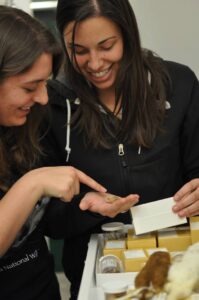KU researchers part of new pilot project to monitor bats, rodents for signs of future pandemic

photo by: University of Kansas
Jocelyn Colella, professor of Ecology & Evolutionary Biology at KU and assistant curator of mammals with KU’s Biodiversity Institute, examines a mammal skull with an undergraduate researcher.
KU researchers are part of a new $1 million federal grant that will monitor bats and rodents around the world to provide an early warning about a future pandemic.
University of Kansas researchers with KU’s Biodiversity Institute are part of a University of New Mexico pilot program that recently received a $1 million startup grant from the National Science Foundation.
The new program, called PICANTE — short for the Pathogen Informatics Center for Analysis, Networking, Translation & Education — will use genomic sequencing, bioinformatics, mathematical modeling and machine learning to pick up on “subtle shifts” in the environments of certain animals that could become carriers of pathogens that lead to pandemics.
Jocylyn Colella, an assistant professor of ecology and evolutionary biology and a member of the new center, said PICANTE is seeking to change the mindset of pandemic research, which often produces a response that is too late.
“Traditionally, when a disease emerges in humans, suddenly we care about it,” Colella said in a KU press release. “That makes us reactive in the way we sample animals, our environment and even people.”
PICANTE will start by focusing its research on rodents that are susceptible to a particular family of viruses known as hantaviruses. If PICANTE proves successful in monitoring for that type of virus, researchers are hopeful it will win a larger federal grant to expand the program in size and scope.
The initial work will involve sampling of bats in Panama. Colella and a KU doctoral student will be in the country next month working on the project. In addition to KU, researchers in PICANTE also come from the University of New Mexico, where the program is based, the Los Alamos National Laboratory, New Mexico State University, Gorgas Memorial Institute for Health Studies in Panama and the Center for Research on Health in Latin America in Ecuador.
The PICANTE project marks the second recent federal award for KU researchers to study ways to prevent future pandemics. As previously reported, evolutionary biology professor A. Townsend Peterson was part of a $1 million NSF grant to establish the International Center for Avian Influenza Pandemic Prediction and Prevention.







